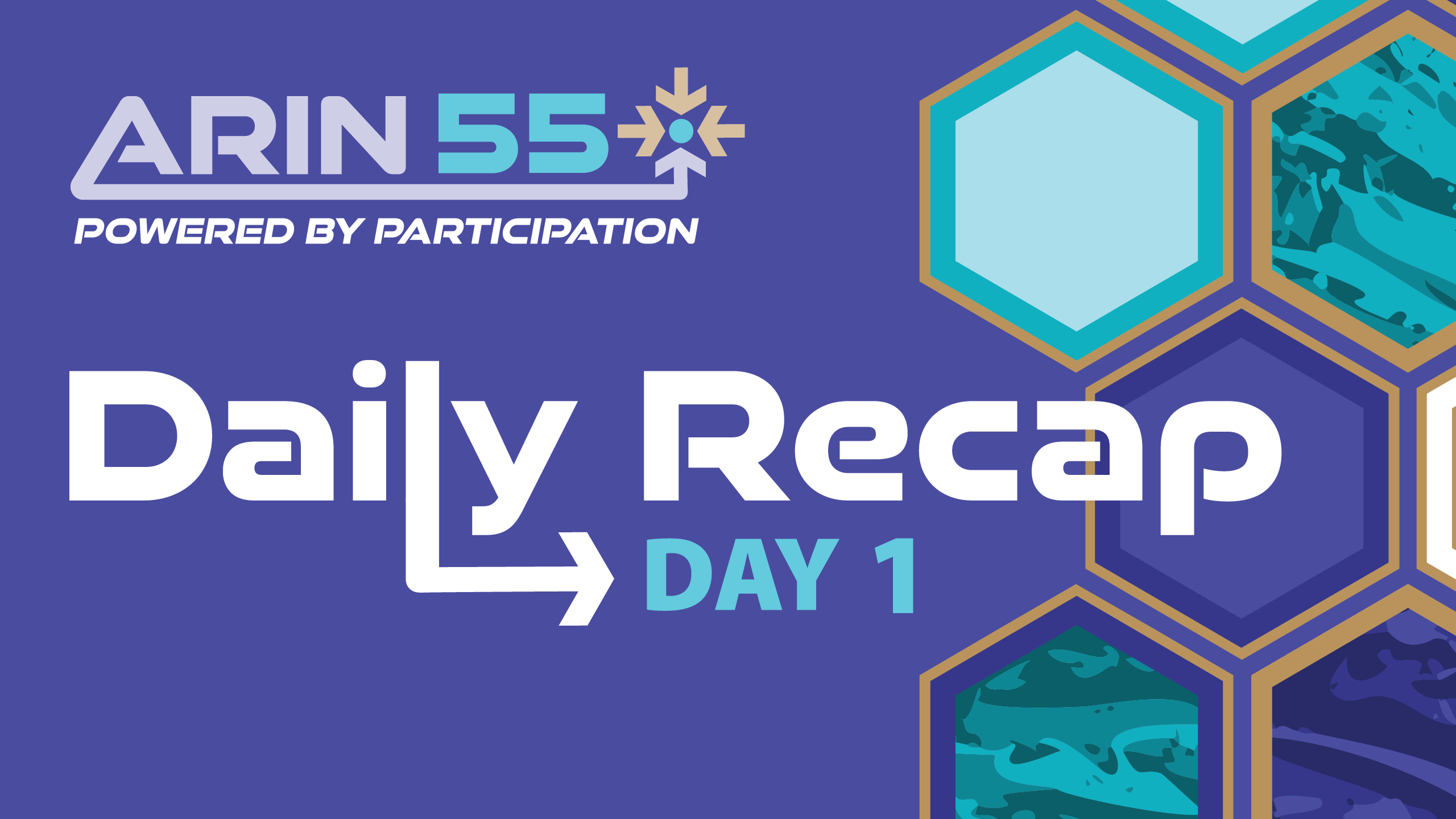
ARIN 55 Day 1 Recap
Greetings from Charlotte, North Carolina, where the ARIN 55 Public Policy and Members Meeting has officially begun — and where there is a city nickname for history buffs, sports fans, and finance gurus alike! We’re excited to welcome both new and familiar faces joining us in The Queen City (aka The Hornet’s Nest aka Banktown) and online for a great lineup of policy discussions, organizational updates, guest speakers, and more. Read on for a summary of what has happened so far at ARIN 55.
Want to join in the discussions remotely? Register before tomorrow so we can invite you to the Zoom webinar.
RPKI Deployathon
Yesterday afternoon we kicked off the week’s activities with a Resource Public Key Infrastructure (RPKI) Deployathon. Onsite participants had a chance to get hands-on experience with creating Route Origin Authorizations (ROAs) to enhance the routing security of their Internet number resources. Director of Customer Technical Services Brad Gorman walked attendees through RPKI, its purpose and key components, and the steps to using ARIN’s hosted RPKI. After the deployathon, meeting attendees gathered at the onsite Welcome Reception that provided a great opportunity to catch up before the busy ARIN 55 agenda began this morning.

Creating a Buzz
As Monday dawned with sunny skies and warm spring air, we began the first official day of the meeting. Director of Communications Hollis Kara got us started with opening announcements, introductions of our Board of Trustees, Advisory Council (AC), and the Number Resource Organization Number Council (NRO NC), and an overview of the meeting agenda. She also offered thanks to our ARIN 55 network sponsor, Spectrum, webcast sponsor, Google, platinum sponsor, AWS, and silver sponsor, IPXO, along with tips for both virtual and in-person attendees to make the most of their meeting experience.
Since ARIN 52, ARIN has been pleased to provide an ombudsperson during its meetings. Hollis reviewed ARIN’s Standards of Behavior then invited Stacey Goodwin Lightfoot of Hinton & Company to introduce herself and explain her role as the ombudsperson in making the ARIN 55 meeting a safe and comfortable space for all participants.
Before flying into the morning’s presentations and updates, we heard opening remarks from John Curran, ARIN President and CEO, who noted his pleasure at being able to join us in person again after his virtual participation in the ARIN 54 meeting. He highlighted the discussions of ARIN policy and of the Internet Coordination Policy 2 (ICP-2) Review on the agenda and emphasized the availability of ARIN leadership, including himself, during the meeting and encouraged attendees to seek them out with questions, comments, and conversation. Bill Sandiford, Board of Trustees Chair, also offered welcome remarks and reiterated the opportunity to connect directly with ARIN staff and leadership throughout ARIN 55.

Nancy Carter, Board Treasurer, kicked off the meeting’s presentations with her ever popular Financial Report. She provided a detailed review of the main business of the Finance Committee along with updates on ARIN’s financial performance and positions, revenues, operating expenses, investments, and long-term financial plan to achieve a balanced budget by year 2030. The Financial Report also included details about ARIN’s data center move, a project begun in the fourth quarter of 2024. Nancy noted that as of now the project is on time and on budget and offered her congratulations to ARIN’s engineering team.

Bill Sandiford followed up with his Board of Trustees Report in which he discussed ARIN’s financial and fiduciary actions along with a look at recent policy ratifications (four Recommended Draft Policies, to be precise).
A Keynote on Collaboration
With the meeting now in full swing, we moved on to the keynote address of ARIN 55: “Strengthening Internet Integrity: Collaborative Solutions for Cybersecurity Challenges.” Leslie Daigle, Chief Technical Officer and Director of the Internet Integrity (I2) Program at the Global Cyber Alliance (GCA), began her presentation with a note that GCA is celebrating its 10th anniversary this year before getting into an overview of the collaboration and interdependence inherent to the operation of the Internet — and how this plays out both for good and bad. She then discussed why securing the Internet is: a) hard; b) a collective action problem; and c) important, and she reviewed what it looks like when we fail and how Internet integrity depends on humans working together overtop the infrastructure of data, names, numbers, and routes.

Leslie continued by assessing how attack campaigns are playing out on the Internet, with small bot traffic having a big security impact, but the good news is that we can see them and perhaps stop them before they become multinational trans-network affairs. The keynote closed with a success story of the collaborative approach to routing security supported by GCA’s I2 Program, which develops platforms to provide insight for analysis of Internet cybersecurity threats and threat actors and builds communities of Internet infrastructure operators to identify and implement solutions. Leslie detailed the principles and positive impacts of the Mutually Agreed Norms for Routing Security (MANRS) global initiative, which GCA took over from the Internet Society, and concluded with the reminder that collaboration is the key to combatting the real threats that exist out in the Internet: We can help ourselves by helping others, and the best solutions come from industry consensus.
Leslie’s keynote inspired a number of questions and comments from meeting participants on topics ranging from the role regulation should play in pursuing Internet integrity, how network operators can access data like that collected by GCA, and how smaller operators or newcomers to the industry can engage in and support collaborative efforts to the need for individuals to take responsibility to shift Internet integrity from a “you” problem to a “we” problem and the importance of knowing where your IP addresses are and what they are doing.
Stay tuned to the blog for an in-depth recap of this impactful presentation in the coming weeks!
Governance and Policy
Continuing the theme of global collaboration, Vice President of Government Affairs Einar Bohlin took the stage next to give an update from the Government Affairs Department (GAD). He introduced the GAD team, its role, and its strategic directives, which include continuing “proactive engagement with governments to support their Internet policy activities.” Einar then discussed the United Nations (UN) Commission on Science and Technology for Development’s World Summit on the Information Society: 20-year Review (WSIS+20), noting that as part of WSIS+20 the UN will determine the fate of the Internet Governance Forum.

After a quick break, John Sweeting, ARIN’s Chief Experience Officer (CXO), delivered the Policy Implementation and Experience Report which focused on out-of-region use (Number Resource Policy Manual [NRPM] Section 9) of IPv4 resources from the ARIN Waiting List (NRPM 4.1.8) and Micro-allocation (NRPM 4.4) and Dedicated IPv4 Allocation to Facilitate IPv6 Deployment (NRPM 4.10) pools.
Join the discussion at the meeting or on our Public Policy Mailing List (PPML) to let us know what you think.
Next, Policy Analyst Eddie Diego provided a glimpse of recent policy proposals from each of the other Regional Internet Registries (RIRs): AFRINIC, APNIC, LACNIC, and RIPE NCC.
AC Chair Kat Hunter shared the Advisory Council (AC) Update and On-Docket Report, introducing how the AC operates, your current AC members (with a special welcome to newest members Lily Botsyoe and William Herrin), seats up for election this year, outreach participation in 2025, and Working Groups. Then she summarized the policy activity since our last meeting, proposals received, items that are on the docket at ARIN 55, and statistics on proposal adoption and abandonment, and she strongly encouraged both in-person and virtual attendees to share their thoughts on these at ARIN 55. Kat also highlighted other volunteering roles available to and taken on by AC members: Nomination Committee, Grant Selection Committee, and Fellowship Mentors.

The morning’s presentations moved along quickly, so we fit in one more before heading into lunch: a Number Resource Organization (NRO) Update from John Curran, which included updates on AFRINIC and the ICP-2 Review process requested of the Address Supporting Organization Address Council (ASO AC) by the NRO Executive Council to strengthen the Regional Internet Registry system.
Lunch and Table Topics
During our break for a reenergizing lunch before the first of this meeting’s two policy blocks, in-person attendees had the option to gather and discuss topics of interest with ARIN AC members and representatives on the NRO NC. The table topics included:
- NRPM Section 6 Allocation and Assignment language with AC members Kaitlyn Pellak and Lily Botsyoe
- Critical Internet Infrastructure (CII) allocations with AC members Chris Woodfield and Bill Herrin
- ICP-2 Review and the new Draft RIR Criteria Consultation with NRO NC members Nick Nugent and Amy Potter

Policy Block
This meeting’s policy discussions were scheduled in two blocks: one on Day One and one on Day Two of ARIN 55. Today, AC members presented each of the following draft policies and then Bill Sandiford opened the floor for community members to provide input and ask questions.
- Draft Policy ARIN 2023-8: Reduce 4.1.8 Maximum Allocation presented by Gerry George
- Draft Policy ARIN 2024-7: Addition of Definitions for General and Special Purpose IP Addresses presented by Kaitlyn Pellak
- Draft Policy ARIN 2024-10: Registration Requirements and Timing of Requirements With Retirement of Section 4.2.3.7.2 presented by Lily Botsyoe
- Draft Policy ARIN 2024-11: IPv4 Transition Efficiency Reallocation Policy (ITERP) presented by Brian Jones

Today’s policy discussions were lively and thorough, with ample comments shared by both in-person and virtual participants. Thank you to all who raised questions and shared their thoughts in support of ARIN’s Policy Development Process!
The Closing Bell
To wrap up the day’s agenda, John Sweeting reviewed the NRO’s most recent Internet Number Resource Status Report, and Nick Nugent shared an update from the ICANN Address Supporting Organization Address Council (ASO AC) that featured a thorough explanation of the ongoing ICP-2 Review process.

To contribute comments on the draft “RIR Governance Document,” subscribe to the ARIN ICP-2 Review public mailing list, which was created to facilitate open community discussion in the ARIN region. For more information about ICP-2, please visit https://www.nro.net/policy/internet-coordination-policy-2/.
Then we took time for community members to ask questions or make comments during an open microphone session hosted by John Curran and Bill Sandiford. Wrapping up the day, Hollis Kara closed with final announcements and adjournment.

See You Tomorrow
With that, we concluded Day One of ARIN 55. Now we’re off to the ARIN Social tonight where we will network with our fellow meeting attendees.
If you would like to refer to anything you have seen (or missed) so far, all slides from today have been posted online on our ARIN 55 Meeting Materials page, and, over the next few days, we’ll also add links to the full transcript and webcasts.
Please be sure to use the #ARIN55 hashtag on social media when sharing about your meeting experience, and we’ll see you back here tomorrow for Day Two of ARIN 55!
Taking photos or screenshots of your ARIN 55 experience? We’d love to share them with the community! Tag, reply, comment, or message us on social media or email us at social@arin.net with images (and photo credit, if needed) that you grant us permission to publish online.
Recent blogs categorized under: Public Policy
GET THE LATEST!
Sign up to receive the latest news about ARIN and the most pressing issues facing the Internet community.
SIGN ME UP →Blog Categories
Guest Post • Public Policy • IPv6 • IPv4 • Updates • Fellowship Program • Security • Grant Program • Caribbean • Outreach • ARIN Bits • RPKI • Internet Governance • Tips • IRR • Elections • Training • Data Accuracy • Business Case for IPv6 • Customer Feedback


